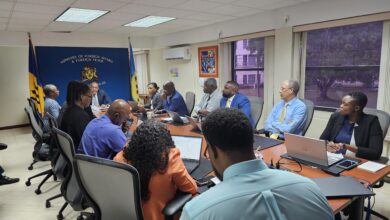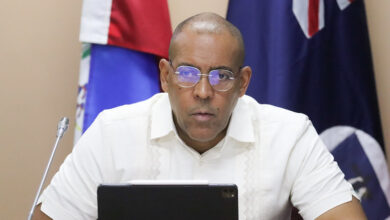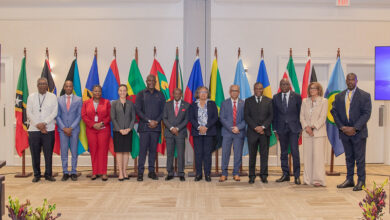The Seventh Meeting of the Council for Foreign and Community Relations (COFCOR) was held in Christ Church, Barbados, on 22-23 April 2004. The Ministers attending were: the Hon. Harold Lovell, Minister of Foreign Affairs, Foreign Trade, Tourism and International Transport, Antigua and Barbuda; the Hon. Frederick Mitchell, Minister of Foreign Affairs and the Public Service, The Bahamas; the Hon Dame Billie Miller, DA, BCH, Senior Minister and Minister of Foreign Affairs and Foreign Trade, Barbados; the Hon. Godfrey P. Smith, Minister of Foreign Affairs, Defence and National Emergency Management, Belize; the Hon. F.O. Riviere, Minister of Foreign Affairs, Trade and Marketing, Dominica; the Hon. S.R. Insanally, OR, CCH, Minister of Foreign Affairs, Guyana; the Hon. K.D. Knight, Minister of Foreign Affairs and Foreign Trade, Jamaica; Senator the Hon. Julian R. Hunte, OBE, Minister of External Affairs, International Trade and Civil Aviation, Saint Lucia; the Hon. Conrad Sayers, Minister of State, Ministry of Foreign Affairs, Commerce and Trade, St Vincent and the Grenadines; the Hon. Ronald Assen, Minister of Foreign Affairs a.i., and Defence, Suriname; and Sen. the Hon. Knowlson Gift, Minister of Foreign Affairs, Trinidad and Tobago.
Ambassador Denis Antoine, Ambassador of Grenada to the United States and Permanent Representative to the OAS represented Grenada. St. Kitts and Nevis was represented by Mr. Osmond Petty, Permanent Secretary, Ministry of Foreign Affairs and Education.
Opening Ceremony
In his Opening Remarks, the Secretary-General of the Caribbean Community (CARICOM), Mr Edwin Carrington, noted that 2004 is a year not only to celebrate events, but also the maturity the Community is showing, particularly in the area of Foreign and Community Relations. He noted especially that 2004 is the year targeted for the completion of certain critical elements of the CARICOM Single Market and Economy (CSME). He observed that one of the major challenges facing the Community is related to the situation in Haiti. He noted that the Conference of Heads of Government had pronounced on this matter and has guided the Community's response to date. The Secretary-General emphasised that it was time to upgrade the Charter of Civil Society, which the Heads of Government adopted in 1997 “from an hortatory to an obligatory instrument.” He also expressed concern that the Revised Treaty of Chaguaramas did not spell out the responsibility of COFCOR in the area of Community Relations and recommended that this meeting of COFCOR pay some attention to this matter.
In his address, Hon Conrad Sayers speaking on behalf of the outgoing Chairman of the COFCOR, the Hon. Louis Straker stated that throughout its thirty (30) years of existence, our Caribbean Community has perhaps never been tested as much as it has been over the past two and a half years.
He acknowledged that the Community has been challenged at every turn on questions of security, productivity, competitiveness, human resource capacity and governance, among others.
The Minister added that, notwithstanding the challenges, we can soberly reflect on the important advances we have made as a Region, and deepen our resolve to accomplish our goals without being side-tracked.
The Chairman of the COFCOR, the Hon. Dame Billie Miller, in her feature address emphasised the importance of policy coordination within CARICOM. She noted that the policy coordination role of the COFCOR must be considered the Council's most vital function in the service of the Community. She stated that the coordination of CARICOM's foreign policy “based on due consultations and the articulation of positions with one voice constitute the most prudent and healthy approach for small vulnerable countries.”
With regard to the slender human resource base of the Region, the Minister indicated that this required an even higher level of organisation and the ability to devise “nimble and flexible means of responding to rapidly changing developments.” The revitalisation of the Bureau of COFCOR was identified as an important step in achieving this end.
She further called upon CARICOM to make greater use of modern technology in facilitating consultations, such as tele- and video-conferencing. She also appealed for greater collaboration in promoting and developing coordinated policies for the enhancement of external economic and trade relations of the Community.
The Minister highlighted the need for a more vigorous public relations effort to provide the public with a full understanding of the state of relations within the Community.
The issue of global security was cited as another fundamental concern for the Region, that tested the scope and strength of the Community's foreign policy. The Minister stressed the non-traditional, non-military threats to security and the multidimensional nature of security itself. She came to the conclusion that the ultimate guarantor of the Region's security is the advancement of the development agenda.
Recognition of the Tenth Anniversary of the Ending of Apartheid in South Africa
The Ministers noted that their meeting was being held a week before the celebration of the Tenth Anniversary of the ending of apartheid in South Africa. Ministers from The Bahamas and Jamaica will represent the Community at the celebrations. They extended their warmest congratulations to the Government and people of South Africa on this milestone and acknowledged the healing of past divisions, the building of a cohesive new society and the significant economic and social progress made during the last decade.
They recalled the common struggle of the Caribbean people with the people of South Africa during the difficult and traumatic years of apartheid. This struggle had however bonded the peoples of the two Regions together, strengthening the solidarity and linkages between them.
Haiti
Ministers indicated that the Human Rights situation within Haiti remained a matter of profound concern. The insecure environment is exacerbated by the existence of numerous armed gangs, many of which exercise effective control over large sections of Haitian territory, underlining the need to make disarmament a priority.
Ministers reaffirmed the importance of the restoration of respect for the fundamental freedoms, the rule of law and the principles of democracy and good governance in Haiti enshrined in CARICOM's Charter of Civil Society and the Inter American Democratic Charter in facilitating a return to stability and in opening the way to social and economic development.
Ministers reviewed issues relating to the representation of Haiti within the Community and how best representatives of Haiti and the interim administration of Haiti could re-establish a dialogue that could lead to a normalization of relations.
Ministers reaffirmed the Community's commitment to provide support to the people of Haiti, a position illustrated by the participation of the Chief Coordinator-designate of the CARICOM Task Force in the donors' meeting in Haiti on 21-22 April. Ministers also called on the international community to fully support the early commitment of financial resources to relaunch the social and economic development process in Haiti.
The Ministers reviewed the developments at the United Nations relating to the establishment of the UN Stabilisation Mission in Haiti. In this regard, they expressed satisfaction that the mission would be multi-dimensional and would seek to assist Haiti in building and strengthening functioning democratic institutions; in supporting the re-establishment of the rule of law; and in promoting social and economic development. Ministers also acknowledged that in order to fulfill its mandate, and in light of the challenging security situation in Haiti, the UN Stabilisation Mission would be required to have sufficient capacity to deal with security threats.
Ministers reiterated the commitment made by CARICOM Heads of Government to participate in the UN Stabilisation Mission in Haiti and its various components, and agreed to coordinate their participation through the CARICOM Secretariat.
Trends in Global Security and their implications for the Caribbean Community
Ministers discussed the subject of Global Security and its implications for the Foreign Policies of CARICOM Member States. They agreed on the need to consider global security not only in terms of an interpretation which gives salience to terrorism, but also from the perspective of the vulnerabilities of small States and the threats posed by a range of global trends. They agreed that the concept of vulnerability of small states needed to be included in the international debate on global security.
Noting the current challenges facing the UN system and the dismantling of international norms, Ministers re-emphasized the Region's commitment to multilateralism and international law as the preferred approach to addressing these challenges and to maintaining the Community's principled approach to issues on the international agenda.
Ministers underlined the linkages between foreign affairs, economic affairs and security issues as exemplified in the Region's discussions with its developed partners, in particular, the United Kingdom and the USA. They agreed to the commissioning of a study on new aspects of a foreign and security policy for the Community in the light of recent developments in the hemisphere and the world community.
Ministers noted the establishment by the United Nations Secretary-General of the High Level Panel on Global Security Threats. They stressed the need for that Panel to take into consideration the concerns of small states such as those of the Region and undertook to formally convey those concerns to the Panel.
They welcomed the convening of a consultation in the Region by the Panel in July 2004.
Coordination of the Foreign Policies of Member States
Ministers reviewed the implementation of the revised foreign policy strategy over the past twelve months, particularly the mechanisms aimed at strengthening such coordination. They agreed that the Bureau of the COFCOR would assume a prominent role in promoting continuous consultation and coordination in light of the dynamics of the current global environment.
They expressed the desire for more involvement of Community stakeholders, including the Regional universities and other academic/research institutions, in the analysis and conceptualisation of foreign policy issues and strategies.
United Nations
Ministers reviewed the Region's participation in the work of the United Nations during the 58th Session of the UNGA. They welcomed the progress made towards revitalizing the work of the UN General Assembly and recognized the leadership role played by the President of the 58th Session of the UNGA, Senator the Hon Julian R. Hunte Minister of Foreign Affairs, International Trade and Civil Aviation of Saint Lucia, on this issue. They commended the President for the manner in which he had acquitted himself and the energy with which he has pursued his tasks. The contributions made by the Region in support of his Presidency have provided an excellent example to the wider international community of the importance of integration movements, particularly for small states.
Ministers noted that the issues to be addressed at the 59th Session of the UN General Assembly which are of common concern to CARICOM Member States included reform of the United Nations, focusing on revitalization of the General Assembly and the Security Council; the outcome of the Mauritius International Meeting to review the implementation of the Barbados Programme of Action on the Sustainable Development of SIDS; Cooperation between the United Nations and the Caribbean Community; follow-up and implementation of the outcome of the International Conference on Financing for Development; the situation of democracy and human rights in Haiti; an integrated approach to the management of the Caribbean Sea as a Special Area in the context of sustainable development; international tax cooperation; macro economic policy issues; human resource management; and follow-up to the outcome of the Millennium Summit, particularly regarding the preparation of the report on the achievement of the Millennium Development Goals (MDGs).
Recognising the strong linkages between sports and the promotion of peace and development, the Ministers highlighted that the hosting of the 2007 Cricket World Cup in the Caribbean presented an additional opportunity for improving relations between the cricketing playing countries of the world.
Organization of American States
Ministers expressed satisfaction that, following the early endorsement by the Caribbean Community, a consensus has emerged regarding the candidature of the former President of Costa Rica, Dr. Miguel Angel Rodriguez, for the position of Secretary-General of the Organisation of American States.
The Community supports the vision outlined by the candidate and is committed to working closely with Dr. Rodriguez to promote an agenda which takes into consideration the social, economic, political and developmental goals of the countries of the hemisphere, and to further strengthen the relations between CARICOM and the OAS. Furthermore, the Community expressed the need for restructuring and modernization of the hemispheric body aimed at enhancing the ability of the OAS to deliver quality services to its Member States.
The Association of Caribbean States
Ministers noted that the newly appointed Secretary-General of the ACS, Dr Reuben Silie Valdez of the Dominican Republic, had assumed his responsibility as head of the ACS Secretariat. They emphasized the importance of strong leadership at this juncture and the need for the ACS Secretariat to pool resources through the various agreements established with integration Secretariats throughout the ACS Region.
They noted the difficulties delaying the convening of the Fourth Summit of the ACS, originally scheduled for November 2003 in Panama but which had not been held to date and the efforts made by the Chairman of the ACS Ministerial Council to canvas Member States on the issue.
They welcomed the leadership exhibited by Jamaica as the new Chairman of the ACS Ministerial Council in focusing on strengthening the ACS as it begins its second 10 years as an organization of consultation, cooperation and coordination in the wider Caribbean. Ministers noted that the ACS Secretariat will prepare a framework study to review the operations of the organization over the past ten years and its future direction. The study would be considered in conjunction with the recommendations put forward by the CARICOM Secretariat.
The Ministers reiterated the importance of the full participation of all Member States in the ACS process and reiterated their commitment to support the leadership of the ACS both at the level of the Ministerial Council and Special Committees, as well as of the ACS Secretariat.
Relations with Third States
Ministers reviewed the Community's relations with third states in the context of the existing foreign policy strategy of the Region.
They agreed that in the conduct of the relations, which the Community enjoys with traditional allies, it was important to preserve and work to strengthen the formal mechanisms established to facilitate political consultations and promote economic and social development among the countries of CARICOM and third states. In this regard, they welcomed the continued collaboration with countries in the hemisphere and the wider international community. They also re-committed to developing strategic alliances with like-minded developing and developed countries in the pursuit of mutual interests.
Chile
Ministers met with the Special Envoy of the President of Chile, His Excellency Cristian Barros, Vice Minister of Foreign Affairs of Chile, on 23 April in the fringes of their meeting to discuss cooperation between CARICOM and Chile in the political and technical fields. They recalled the fruitful exchanges held between CARICOM Heads of Government and the President of Chile in January 2004 in Monterrey, Mexico and the First Meeting of the CARICOM-Chile Joint Commission held in the margins of the XXXIII Meeting of the OAS General Assembly in Chile in June 2003. These exchanges have led to the deepening of relations between CARICOM and Chile.
They discussed the situation in Haiti and reaffirmed their commitment to participate in international efforts to assist in the economic and social reconstruction of that country.
Cuba
The Ministers noted the strong bonds of friendship and cooperation which have characterized CARICOM-Cuba relations over the years and looked forward to the convening of the First CARICOM-Cuba Ministerial Meeting before the end of July 2004 and the CARICOM/Cuba Joint Commission Meeting in Trinidad and Tobago in the last quarter of 2004.
Japan
The Ministers discussed preparations for the Second CARICOM-Japan Ministerial Meeting later this year. The Government of Antigua and Barbuda has agreed to host this important meeting which would build on already established areas of cooperation.
Spain
The Ministers noted the recent installation of a new Government in Spain and expressed the hope that the relationship between the Caribbean Community and Spain would be strengthened over the coming years, particularly through regular meetings and the implementation of the Scientific and Technical Cooperation Agreement signed in July 1999.
They noted the candidature of Spain to host Expo 2008 in Zaragoza under the theme “Water and Sustainable Development” and the initiative being taken by Spain to encourage participation by CARICOM countries in that Expo should the candidature be successful.
The United States of America
Ministers reiterated their commitment to continue their efforts of cooperation between the Caribbean and the USA, with a view to ensuring that this long-standing and important relationship is strengthened. They noted that the relationship between the USA and the Caribbean under the Third Border Initiative builds on the Bridgetown Accord in the several areas identified for joint pursuit/cooperation while at the same time recognizing the changes, which have taken place since the First US-Caribbean Summit of 1997.
Ministers noted the several occasions on which meetings had been held with members of the US Administration over the past three years and emphasized the importance to the Community of the maintenance of a strong and sustained dialogue with the USA, driven by an agenda, which also represents the priority concerns of the Region.
Third European Union-Latin America and Caribbean Summit
Ministers noted the added significance of the Third European Union-Latin America and Caribbean Summit, which will take place in Guadalajara, Mexico, on 28 May 2004, as it would be the first Summit in which the newly enlarged European Union (EU) would be engaged. They welcomed the opportunity provided by the Summit to assess progress made by the bi-Regional partnership since the Madrid Summit in 2002 and to improve coordinated action in the priority areas identified in previous Summits as well as to address the challenges to combat exclusion and inequalities in the respective societies.
Ministers emphasised the importance of the Summit issuing a call for the reinforcement of the multilateral framework for addressing the political, economic and social issues confronting the international community and in particular with regard to the challenges posed by terrorism and trans-national crime. They called for the Summit Declaration to give prominence to the concerns of the small, vulnerable states of the Caribbean and to reflect the commitment of Latin America and the European Union to work together with the Caribbean to ensure that the outcome of the negotiations under the Doha Development Agenda meaningfully address the concerns of smaller economies including the issue of special and differential treatment.
They reiterated the commitment of the Region to conclude an economic partnership agreement with the European Union, which would place emphasis on the priorities for Caribbean development supported by equitable trade arrangements.
The International Meeting on the Review of the Barbados Programme of Action (SIDS+10)
Mauritius, 30 August – 3 September 2004
Ministers took note of the preparations being undertaken for the International Meeting by the United Nations Commission on Sustainable Development (CSD), and supported the Nassau strategy document as the basis for negotiations in undertaking the ten-year review of the Barbados Programme of Action at the International Meeting to be held in Mauritius in August-September 2004.
In this regard, they emphasized the need for issues related to trade, the reform of the international financial system the trans-shipment of radioactive waste through the waters of SIDS, and graduation to be retained in the document. They also re-emphasised the need for Small Island Developing States (SIDS) to be recognized as a special grouping within the international system and to which some measure of special and differential treatment should be accorded. They encouraged the developed partners to commit themselves to the provision of adequate resources to facilitate the effective implementation of the Barbados Programme of Action and considered that partnership arrangements are a possible means of achieving this objective.
Ministers endorsed the position that the Caribbean Region should be represented at the international meeting at the highest level.
Belize/Guatemala
Ministers were briefed on the ongoing process in respect of the Belize – Guatemala Territorial Differendum.
Ministers reaffirmed unequivocal support for the territorial integrity and sovereignty of Belize and for the mechanism and goals of the “Agreement to establish a Transition Process and Confidence Building Measures between Belize and Guatemala” signed on 7 February 2003, which maps the best possible route to a just, equitable and permanent solution of this territorial dispute.
Guyana/Venezuela
Ministers received an update on the relations between Guyana and Venezuela and noted that those relations reached a high point in the visit to Guyana by the President of Venezuela in February 2004.
Ministers were informed that the two countries remained committed to the peaceful settlement of the border controversy through the Good Offices role of the United Nations Secretary General.
Ministers reiterated their support for the sovereignty and territorial integrity of Guyana.
Bird Rock
In relation to Bird Rock, a small geographic feature not far from Dominica, St. Kitts and Nevis and Antigua and Barbuda, Ministers noted with concern the recent authorization of funds by the government of Venezuela for the establishment of a scientific naval base on Bird Rock designed to bolster its claim to sovereignty over the rock.
Ministers called for an early discussion on the matter between Venezuela and the affected States to be conducted in accordance with the principles of international law. They emphasized the centrality of the UN Law of the Sea Convention and called on all States to respect this universal instrument as the codification of international law and practice on matters relating to the world's seas and oceans.
Movement of Hazardous Waste
Ministers noted with concern the recent passage of a shipment of nuclear waste through the Caribbean Sea. They recalled the statements by the Heads of Government that the Region is implacably opposed to this practice. They observed that in the current international environment when the safety and security of populations is of foremost concern, the movement of hazardous material through the Caribbean Sea constitutes a serious ecological and security threat to the Caribbean people. They called on all the States involved in the transshipments to desist from the practice.
Appreciation
Ministers extended their deep appreciation to the Government and people of Barbados for the warm hospitality extended and for the excellent arrangements made for their meeting in the magnificently restored heritage property, which facilitated greatly the smooth conduct and efficiency of the meeting.
Date and Venue
Ministers accepted the offer of The Bahamas to host the Eighth Meeting of the COFCOR in that country on 5-6 May 2005.
Christ Church,
Barbados
23 April 2004





